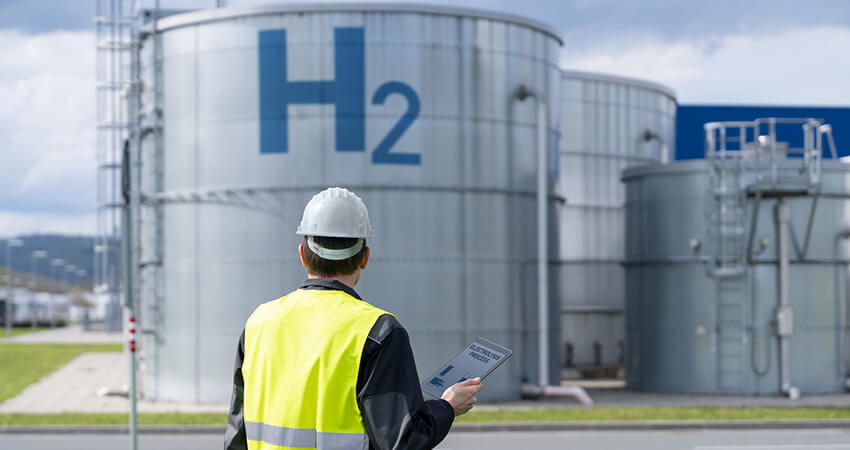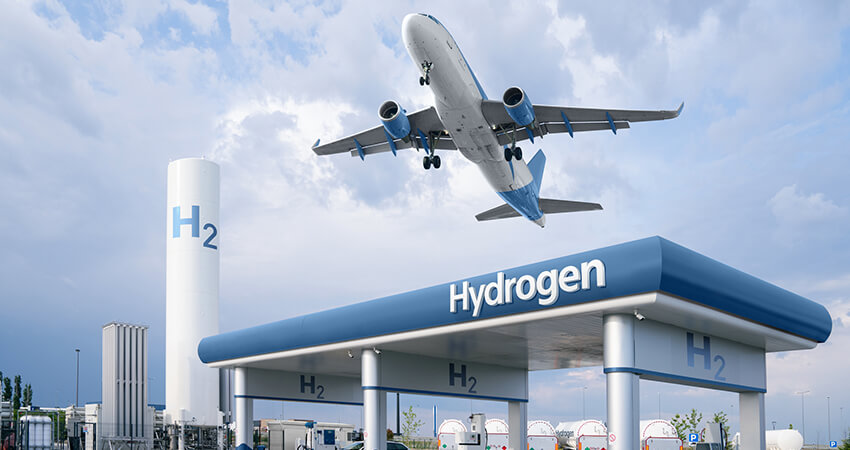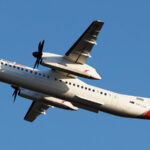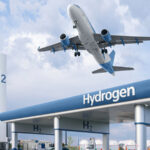The possibility of using hydrogen to power airplanes has been around for over half a century. In the 1950s, there were already projects aimed at incorporating this fuel into the commercial aviation world. However, today, the need to use more sustainable techniques that do not emit greenhouse gases has given new impetus to hydrogen plane projects.
There are projects underway in many parts of the world, such as those of the American companies Universal Hydrogen and ZeroAvia, or the Dutch company Aerodelft. Many of them combine different ways of converting this fuel into electricity, which is ultimately what powers the aircraft.
The advantages of these types of planes are particularly significant for the environment. Hydrogen combustion produces a gas that is essentially water vapor, making it an efficient solution for reducing greenhouse gas emissions. It could even be a more profound solution than other alternatives, such as the use of Sustainable Aviation Fuel (SAF).
Airbus’s Bet on Hydrogen Aircraft

The Hydrogen in Aviation (HIA) alliance seeks to accelerate the production of carbon-free hydrogen-powered aircraft and counts a heavyweight of the aviation industry among its members: Airbus. Other important companies in the sector, such as the low-cost airline EasyJet, turbine manufacturer Rolls-Royce, GKN Aerospace, and Bristol Airport, also participate.
Airbus, standing out in this initiative, is working on developing the technology to have its first hydrogen aircraft in the air by 2035. This “zero-emission hydrogen aircraft,” the ZEROe, will use two different techniques for propulsion. On the one hand, the combustion of hydrogen itself, which works similarly to conventional hydrocarbons. On the other hand, it will use hydrogen fuel cells, which produce electricity and power electric motors. According to the company, both technologies are complementary.
While Airbus is getting involved for the first time in manufacturing its own engines, other companies like Rolls-Royce and General Electric also participate as suppliers in the initiative. The former has already conducted successful hydrogen tests.
No Batteries
Unlike electric vehicles, using batteries in medium and long-distance airplanes is impractical, according to experts. This is due to the low energy density of this technology. In other words, to achieve the necessary energy, the weight of the batteries would be disproportionately large compared to the energy they contribute to the flight of the aircraft.
However, some companies plan to use batteries in fleets of small short-haul aircraft, such as United Airlines, which plans to employ some for short-distance flights.
Hydrogen Plane Prototypes for the Commercial Aviation Sector

While some electric projects face the challenge of limited cargo or passengers they can transport, hydrogen planes promise to have capacities much closer to those of planes using petroleum derivatives for fuel.
As Airbus explains, it has three prototypes: one is a turboprop plane, which could carry about 100 passengers, another is similar to a jet, with a capacity of around 200 passengers and more autonomy. In contrast, the third would have an innovative design, more like a delta wing.
The different technologies are already in the testing phase, as reported by the company itself. Experiments are being conducted at its plants in the United Kingdom, France, Germany, and Spain to put this technology into operation. Adapting aircraft to this technology involves adjustments to the materials and technologies of the fuel system.
First Commercial Flight in a Hydrogen Aircraft
In the race to achieve the first hydrogen aircraft in the air, the English company ZeroAvia stands out by announcing that it will fly its 19-seat hydrogen plane from London to Rotterdam The Hague in 2024. This project is backed by the Royal Schiphol Group, Rotterdam The Hague Innovation Airport Foundation, and ZeroAvia itself.
This company plans to start with short-haul flights of 500 miles, offering a more sustainable and cost-effective alternative.
Challenges and Potential of Hydrogen in Aviation
The use of hydrogen in aviation faces significant logistical and technical challenges but emerges as a promising solution to reduce CO2 emissions. Hydrogen, whether as fuel or through fuel cells, could transform the aviation industry, starting with short-haul planes and progressing to larger and more powerful models.
The successful implementation of hydrogen planes will require collaboration among the industry, governments, and suppliers to overcome logistical challenges and ensure the adaptation of infrastructure, such as airports, for hydrogen storage and refueling. Airbus, ZeroAvia, and other companies are on the path toward a more sustainable, emission-free aviation, but there is still a long way to go before hydrogen planes become a daily reality in our skies.










